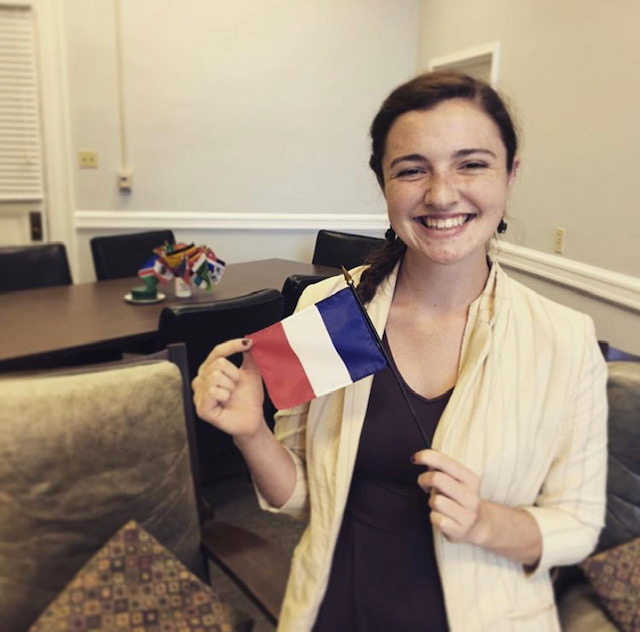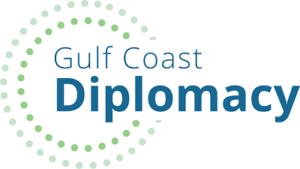At the end of my senior year of high school, I was feeling rather melancholy about my upcoming summer. With plans to take a gap year to travel starting in the fall, I was working three jobs that filled up all my free time. I saw the summer set out before me as filled with monotonous work. I figured I could stick it out to save up for my international experiences, but I never expected to have an international experience before I even boarded my plane to go overseas.
However, at a Youth Diplomats meeting in May, Jena Melancon introduced us to a program called “The Experiment Digital,” or TED for short. It was aimed at creating a digital cultural exchange between students from the Middle East and America.
Immediately, my ears perked up. The experience required nothing but a small-time commitment every week and availability to video chat every two weeks. It would be my safe haven from a summer filled with routine.
Not only was I excited about getting to meet new people and understanding their perspectives on the world, but I was also eager to learn more about Middle Eastern culture and compare belief systems to those common in the U.S.
When it came to my perspective on the Middle East, as I believe is true for many Americans, I was only exposed to those of a certain opinion. I grew up in military communities and, while those involved in the conversations certainly have a unique perspective, I was always missing the other side of the story.
As someone who values diplomatic relations, I know the value of being open to the views of all parties involved in certain issues to promote deeper, more objective, understanding of those situations. The Experiment Digital gave me this opportunity to explore my curiosity about U.S.-Middle East relations, while also exposing me to first-hand perspectives of the diversity in Middle Eastern cultures and values.
Upon getting into the program, a student is placed within a digital neighborhood where you have weekly discussions and tasks to share with your neighbors. For every one American, there were about five students from the Middle East, making for a fascinating experience. From your neighborhood, you are further categorized into a digital family. This is where you will have conversations that dive deeper into complex topics, share your ideas and support with the group, as well as regularly video chat to form a greater bond.
In these groups, you are prompted with multiple challenges and discussions for collaboration. These scenarios created a space where students could freely share their ideas with each other and work in a setting where compromise and diplomacy were necessary.
For example, one of our first neighborhood challenges was to decide from a list of items what three things to save on our sinking boat. Though seemingly simple, when you have a vast collection of people with different ideas and views we quickly realized how important clear communication was on a digital platform to fairly represent all parties involved. We ended up limiting our choices and used a poll to finally select the last three. It took a collaborative effort from the group as a whole but we ended up surviving the scenario.
It was prompts like these that quickly pushed me to apply leadership skills on a digital platform and to learn what that may look like. In a situation where you are dealing with language barriers and different time zones, many challenges pop up that you wouldn’t expect. Yet, what I’ve learned the most from those situations is that being patient, taking the time to ask, or address, questions, and allowing space for those who are more hesitant to share ideas is incredibly important to developing a thriving community.
In a world that is becoming increasingly more reliant on technology as part of our lifestyles, it only makes sense that the nature of international exchanges would follow suit. As a young leader, you are continuously faced with challenges that make you come to terms with your weaknesses. During The Experiment Digital, I found how complex it really was to apply leadership skills you use in face-to-face interactions on a platform that requires a different set of communication skills. Additionally, it sincerely opened my eyes to how important it is to put in the energy to understand a different cultural perspective. Inviting conversation with someone with views different than your own sheds light on what it is your missing in your own perspective.
Throughout the summer, we were also working as individuals to reflect on an issue prevalent in our everyday lives and communities. Over the course of each week, we had a goal presented to us as a group on how to develop a new leadership skill, and eventually, all those lessons added up to give us the tools necessary to address the issues we were seeking to address. Everything we were practicing as a group prepared us to be a better leader in our own communities.
Towards the final portion of the program we were challenged to create action plans for the issue we’d like to address and to share our ideas with the group for feedback to make our personal projects better. It was a wonderful way to consider additional perspectives on how to approach addressing an issue, and also provided us all with ideas we may have never thought of on our own.
Working with other young activists so dedicated to creating positive change in their communities was an incredibly inspiring experience. The Experiment Digital made my whole summer more enriching and thought-provoking then it would’ve been otherwise. I would firmly say it has also prepared me to go into my travels and future interactions with foreigners with more confidence and excitement. We have so much to learn from each other in this world. It is nonsensical to keep the doors to international experiences shut when they bring so much beauty and inflow of ideas to all that are lucky enough to be a part of it.
I’d encourage anyone with the slightest interest in cultural diversity or global politics to apply for this program in the upcoming year. It will give you an insightful experience that will forever change your outlook on being a leader and global citizen.
By: Eden Davenport – Intern at the Gulf Coast Citizen Diplomacy Council, former Youth Diplomat, and recent high-school graduate currently working in France

